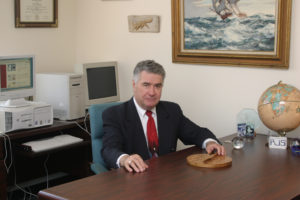
By Richard John Stapleton, PhD, CTA
A decision was made in June of 2018 to encourage the formation of De-Gaming Democracy groups around Spaceship Earth to facilitate relevant face-to-face discussions about economic and political affairs. Earthians spending more and more time staring at computer and cell phone screens looking at faces, hearing voices, and reading fake news, gossip, and even truthful news has not resulted in economic and political progress. Something new needs to be tried. As Albert Einstein pointed out, doing the same thing over and over expecting a different result is insane.
The Classroom De-Gamerâ„¢ is a three-quarter-inch-thick circular board twelve inches in diameter with concentric circles of numbers affixed to accommodate teaching and learning groups of various sizes. I have published articles describing the purpose and use of the device in Research in Education (1978), the Transactional Analysis Journal (1979), and The Organizational Behavior Teaching Review (1990).
The Classroom De-Gamerâ„¢ De-games psychological Games in face-to-face learning processes by banishing Persecutors, Rescuers, and Victims, essential roles for psychological Games, from the discussion. No teacher or learner in a De-gamed process can psychologically feel or think s/he is being persecuted, rescued, or victimized if randomly selected by the Classroom De-Gamerâ„¢ to answer questions in the whole group. All group participants have an Adult contract to socially participate in the process using their Adult ego states. The Drama Triangle, a prerequisite for psychological Games, around which Rescuers, Persecutors, and Victims switch roles as they transact with one another, is disallowed in the process.
The De-Gaming process engenders liberty, equality, and fraternity among participants. It engenders response-ability that helps people get their needs met. It causes people not to discount the emotional and intellectual worth and abilities of themselves and others. The process is democratic, not authoritarian.
The De-Gaming teaching and learning process will work regardless of whether you understand transactional analysis concepts such as Parent, Adult, and Child ego states, transactions, scripts, rackets, discounts, the Drama Triangle, OKness, and I’m OK – You’re OK life positions. For more information and understanding of what they are, if interested, read my book Born to Learn: A Transactional Analysis of Human Learning at https://www.amazon.com/Born-Learn-Transactional-Analysis-Learning/dp/0692584331.
For more information showing how I applied this De-Gaming process over five years in a US manufacturing corporation doing business internationally involving some three hundred employees from all departments and levels of a plant read my e-book Recommendations for Waking Up From the American Nightmare at https://www.amazon.com/Richard-John-Stapleton/e/B001KHS3P6
The major objective after the Classroom De-Gamerâ„¢ has been spun is answering all three Adult Questions below as best you can if the spinner lands on you:
What is the problem or opportunity?
What are the alternatives?
What do you recommend?
Most likely some participants will disagree with your answers after you lay them out and the group will then discuss alternative answers, hopefully developing a consensus by the end of the discussion about what is right. If not, that’s OK. Being left hanging at the end of a session may motivate you to think of better answers later, maybe in your dreams. Better answers may be brought up in later sessions. Deciding what is the most important problem you know about is the most difficult decision you will have to make if the spinner lands on you. That’s what leaders do; decide what problem to focus on. Most of the time the spinner will only be spun one time per session, at the very beginning. In most sessions most of the time of the session will be spent discussing answers laid out by the De-Gamer-selected person, the most powerful person in the group that day, the randomly selected leader selected by fate at the beginning of the session, the start of a new day. On the other hand, some days the De-Gamer might be spun more than once, if a discussion runs out of steam, in which case the last person pointed out will spin the De-Gamer again to select another leader and set of answers for a different problem or opportunity.
True democracy entails individual humans having an opportunity to influence and vote for actions and people that reflect their factual experiences, thoughts, decisions, and recommendations regarding how families, schools, businesses, social and civic groups, and political organizations should be run. It seems to me all people should have a fundamental right to think about and discuss problems and opportunities facing the organizations that shape and control their lives.
Spaceship Earth, among many other things, is a giant classroom in which humans learn how to deal with current reality wherever they live.
All humans around Spaceship Earth, Earthians, learn something every day in various ways, working, playing, and merely existing, from others, from various media, from schools and churches, and from being exposed to facts of experience doing life tasks. The problem is most humans do not learn as well as they might qualitatively and as much as they might quantitatively because of getting set in their ways and because of political and social forces that cause them not to learn, forces that cause them not to think about certain problems and opportunities, not to feel what they feel, and not to say and do what they think is right.
Discussing the three reality questions in De-gamed groups will give isolated individuals feedback from others in the group regarding what they feel, think, do, and want, and will teach and enable them to learn alternative ways of feeling, thinking, doing, and wanting.
De-gamed discussion groups importantly are dialectical, meaning people will argue with facts and reasoning about different answers, which tends to develop workable consensual synthetic answers over time, thereby reducing the pernicious effects of dogmatic and doctrinaire polarizations.
Humans are enslaved around Earth in various ways to obsolete scripts, dogmas, and doctrines by familial, religious, business, political, and military forces, having been taught by authoritarian teachers that tell their subjects what to feel, think, and do. They primarily teach their subjects to obey and memorize, not to think and learn.
Conformity is the order of the day in human history, humans feeling, thinking, and doing the same things the same way day after day generation after generation.
A way out of this box is for everyone to become a teacher and a learner in a bottom-up democratic process starting with the basics of reality confronting any child, woman, and man around Spaceship Earth, dealing with three fundamental survival questions:
What is the problem or opportunity?
What are the alternatives?
What do you recommend?
And the process starts with you. You have to get people from various walks of life and ages in your community together for face-to-face democratic discussions, and explain the rules:
1 – A leader will be randomly selected to start all discussions by spinning the De-Gamer
2 – All randomly selected leaders will answer the three basic Adult survival questions if pointed out by the spinner
3 – No one may interrupt anyone in the discussions
4 – Holding up your hand to force someone to force everyone to remain silent so you can talk is outlawed
5 – You may say whatever you want after the randomly selected person finishes presenting his or her answers, but you have to assert yourself and start talking before anyone else does
6 – And so it goes throughout the time of the discussion
7 – How long good discussions should last is up to you but they will generally last an hour or so
8 – Verbal and physical attacks are outlawed
9 – All members of the group must listen to what the person currently talking wants to say regardless of whether they agree. After the person currently talking stops talking you can then rebut or say what you want if you can start talking before anyone else does. Otherwise you have to wait until the person beating you to the punch stops talking before you can try to talk again
10 – Communicating with individuals sitting to your left or right, or anywhere in the circle, is outlawed, except when you are responding to an individual about something s/he has said to the whole group or in response to you about something you said to the whole group
11 – Smirking and negative body language messages of all sorts are outlawed
12 – There can be no private conversations during a discussion session
13 – All cell phones and electronic devices must be fully disabled during a discussion session
14 – If you are not willing to abide by the laws and rules of the process then you cannot be a member of the De-Gamed democratic community discussion group.
You may need other rules for your groups, depending on unique circumstances, but the above rules cover the basics. You get the idea. Everyone should have a chance to be the leader of the day. This is not a novel idea. The Greeks had this idea for how to do democracy as early as the Sixth Century BCE. True enough only free Greeks were eligible for random selection for discussions but at least leaders were freely and democratically chosen from a relatively large pool. The process is known as sortition. Everyone is a free Greek in the De-Gaming democratic process. There are no slaves. All participants, including you, learn by doing, by saying what they truly feel, think, and recommend and by getting feedback from members of the group that generates new Game-free discussion and learning for all participants.
How often should you get your group together for discussions? Ideally several times a week for several years, but any frequency will be better than none, once a week, once a month, once a year, whatever.
In the interests of full disclosure I used the De-Gaming discussion process teaching with the case method thirty-six years in business schools primarily using paper cases written by casewriters at Harvard and Stanford, and the University of Alabama, while using the process using current facts as the case consulting with various groups, such as the above mentioned manufacturing plant. I have described the process in various media, and I have reprinted and included articles, cases, and chapters dealing with complications and conflicts using such a process may entail, caused by agitated threatened teachers and learners in the environment not approving of the De-Gaming discussion process, especially the teacher and learners sitting in circles, also providing data and evidence the democratic De-Gaming discussion process works, in my books Business Voyages: Mental Maps, Scripts, Schemata, and Tools for Discovering and Co-Constructing Your Own Business Worlds and Born to Learn: A Transactional Analysis of Human Learning, both published by Effective Learning Publications, available at:
https://www.amazon.com/Business-Voyages-Schemata-Discovering-Co-Constructing/dp/1413480810
https://www.amazon.com/Born-Learn-Transactional-Analysis-Learning/dp/0692584331.
You can find four articles I published in 1978, 1979, 1990, and 1998 on De-Gaming democracy processes in the Transactional Analysis Journal, a refereed professional journal at
http://journals.sagepub.com/loi/tax.
I also described the De-Gaming process in two out-of-print books of readings and cases I researched, wrote and used in my small business and entrepreneurship courses, published by University Press of America, Managing Creatively: Action Learning in Action (1976) and The Entrepreneur: Concepts and Cases on Creativity in Business (1985) – and in one out-of-print trade book published by Effective Learning Publications, De-Gaming Teaching and Learning: How to Motivate Learners and Invite OKness (1979).
For more information and some of my current thoughts on how I used the De-Gamer in my classrooms read my article, “The Classroom De-Gamer,” published June 6, 2018 in the Effective Learning Report at https://blog.effectivelearning.net/the-classroom-de-gamer/. This article discusses in more detail some of the procedures, problems, opportunities, and advantages of using a Classroom De-Gamer teaching and learning.
It seems to me the best strategy for homo sapiens getting out of their on-going mess, now trending towards global fascism or anarchy, and chaos, is for all humans to become good citizens aboard Spaceship Earth, considering themselves the rightful owners of the planet, and assume responsibility for making political and business decisions necessary to successfully manage planetary affairs in a bottom-up process in the interests of all inhabitants. It seems to me principles of management I espoused in “Academic Entrepreneurship: Using the Case Method and Transactional Analysis to Simulate Competitive Business Markets,” reprinted in full in Business Voyages, apply to citizens and owners of Spaceship Earth as well as they do to business students, small business owners, and employees of large fascist organizations. This article was originally published in the Organizational Behavior Teaching Review (now Journal of Management Education), Vol. XIV, Issue IV, 1989-90.
For more on how to manage Spaceship Earth according to me, read my recent Internet article “Toward the Creation of Spaceship Earth Incorporated,” first published in 2013 by MWC News (Media With Conscience) at http://mwcnews.net/index.php?option=com_content&view=article&id=31023&catid=38&Itemid=125.
Awareness has been growing among independent Internet writers and publishers for several years that democracy in the Western World is in decline. Governments have become increasingly dysfunctional meeting the needs of citizens. The ideals of the French and US revolutions – liberty, equality, and fraternity – incrementally achieved to some degree in the West from about 1800 to about 1980 – are now waning. Since the Reagan administration in the US and the Thatcher administration in the UK in the 1980s the aristocrats have gotten richer and the peasants, serfs, and slaves have gotten poorer, while the bourgeoisie has shrunk. Inequality of incomes, wealth, and quality of life among citizens has skyrocketed in the last few years, while liberty and fraternity have plummeted. Overpopulation, environmental pollution, and global warming increasingly threaten the sustainability of human life itself. It is now obvious that unfettered capitalism does not work for most Earthians. Quasi-communist countries and quasi-dictatorships such as China and Russia are now in some ways as democratic and capitalistic as the US and the UK.
If trends continue … there is a good probability Earthians regardless of what kind of economic and political system they now live under will wind up through time being governed by an authoritarian totalitarian global military police system that rules all countries now geographically delineated aboard Spaceship Earth using a magnum computerized central control system, programmed at the top by a technocratic elite, with robots doing most of the physical work around Earth, with most humans doing what they are told living on handouts in reservations–or after a military nuclear catastrophe what’s left of the human species will atomize into superstitious tribal groups with no control system, with individuals living short hard brutish lives in poisoned inhospitable environments.
There is also some probability a system will evolve that enables humans in groups to democratically decide how to govern and manage their affairs around Spaceship Earth producing consensual approaches that produce peace and prosperity instead of war, and equality of opportunity and respect instead of hatred, while retaining the advantages of life-enhancing scientific and technological discoveries and innovations.
Capitalism in the West and communism in Russia failed because they allowed and encouraged weak-minded greedy unethical individuals at the top of centralized hierarchical organizations to acquire and monopolize more and more power and money through time causing widespread hatred, corruption, and dysfunction in the whole system.
Decentralized ground-up De-Gamed democracy has never been tried around Spaceship Earth. It’s time to give it a shot. Bring out the Classroom De-Gamers and let’s see what real people can come up with.
You don’t need a manufactured circular piece of wood with numbers and a spinner attached to De-Game your face-to-face community democratic discussion groups. Anything that will spin on a firm level surface will work, such as a bottle. The best size for discussion groups in my opinion is from ten to thirty people, but they can be larger. Some case method classes in business schools contain as many as one hundred students.
De-Gamed fact-based teaching and learning processes should not be limited to teaching elite students in elite schools that will use what they learn to manipulate economic and political systems to only benefit themselves after they graduate when they reach the top level of large fascist organizations: De-Gamed fact-based discussion groups can cause effective learning to occur in anyone aboard Spaceship Earth in any community, village, town, or city in any sort of clearing or physical structure.
Have your participants sit in a circle and put your spinner in the middle of the group, spin the spinner, and give it a go, answering the three survival questions and discussing the answers, answering the questions yourself if the spinner lands on you:
What is the problem or opportunity?
What are the alternatives?
What do you recommend?
For once give anyone a chance to feel, think, and say what s/he wants face-to-face in a response-able Game-free democratic group of people.
Feel free to forward, share, print, reprint, publish or otherwise disseminate this article any way you see fit, on the Internet or elsewhere.
Richard John Stapleton, Founder & Owner, Effective Learning Company, 32 East Main Street, Statesboro, Georgia, USA, www.effectivelearning.net


